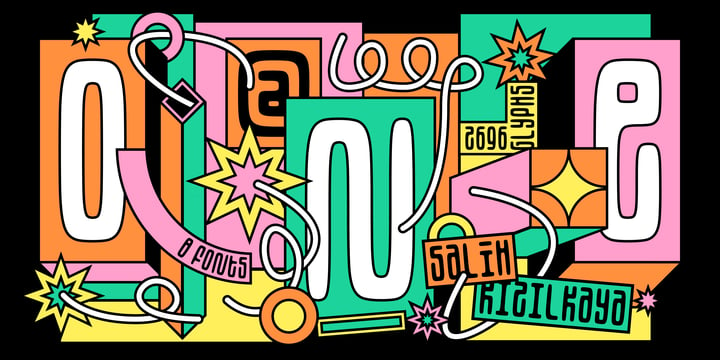 |
SK One Block was designed by Salih Kızılkaya in 2020. Inspired by Kufic typeface, this font includes many typographic material you will need. SK One consists of 8 different fonts and 2696 glyphs.
 |
SK One Block was designed by Salih Kızılkaya in 2020. Inspired by Kufic typeface, this font includes many typographic material you will need. SK One consists of 8 different fonts and 2696 glyphs.
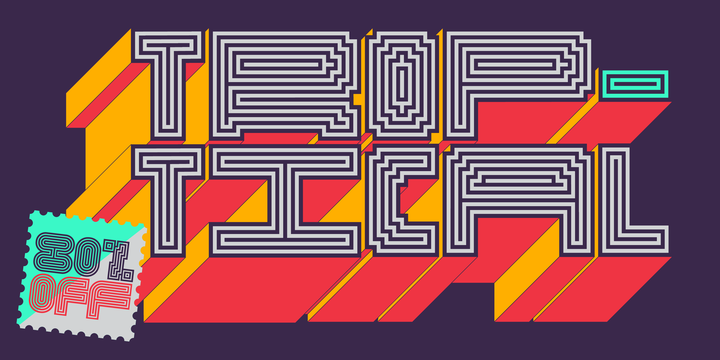 |
Troptical is a hypnotic, energetic multilinear typeface that’s all rhythm and movement. Featuring concentric lines and angular construction, Troptical is inspired by the dazzling dynamism of op-art and the clever geometry of Latin American design, with a dash of 8-bit video game playfulness.
Beneath its art-party, sporting-stripe vibes, this typeface is practical to the core. Troptical’s modular, building-block characters that were born to stack. And with five variable widths interchangeable across its three styles, it’s a typeface specifically developed for mixing and matching characters so every word is a design in itself. Troptical comes in three line weights across all styles and widths. C’mon, let’s dance.
Font specs
Designed by In-House International and led by Alexander Wright, Troptical is available for Opentype format (.otf) compatible with Mac and PC. Each style family also includes a Variable option designers using compatible platforms. Check compatibility / support status for variable fonts at v-fonts.com/support/
Troptical is available in five standardized, interchangeable widths marked with ascending numbers that represent their span in columns: 10, 15, 20, 25, and 30. Each width is offered in three weights: Light, Medium and Bold.
With a total of 45 unique fonts across such a wide range of weights and styles, this type family makes it easy to create optical, dynamic typographic treatments for when you just need your stills to move. It’s perfect for logos, large and graphic headers, publishing applications, presentations, packaging, apparel, merchandise and pedestrian-focused outdoor signage.
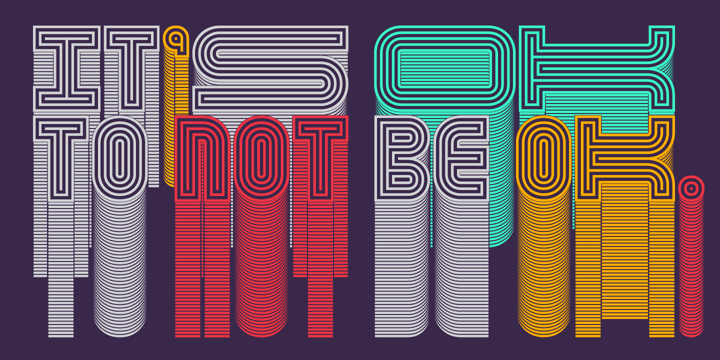 |
| Download Troptical Fonts Family From In-House International |
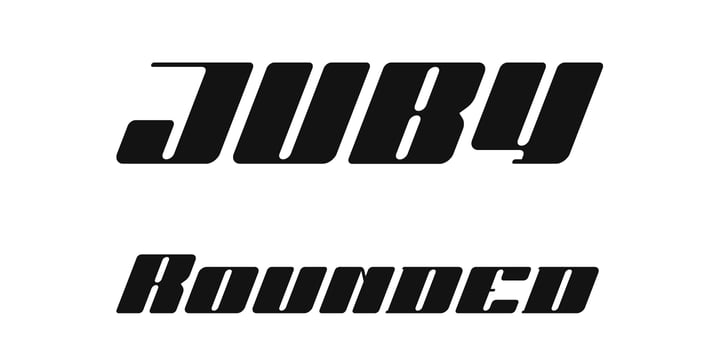 |
Juby Rounded - Heavy, visible and distinctive display font, rounded brother of the Juby Font.
Designed especially for display purposes. Can be used successfully in posters, headlines, visual identities, and everything needs to stand out.
Font containing uppercase and lowercase characters, numerals and a large range of punctuation.
The family has 3 weights with matching italics.
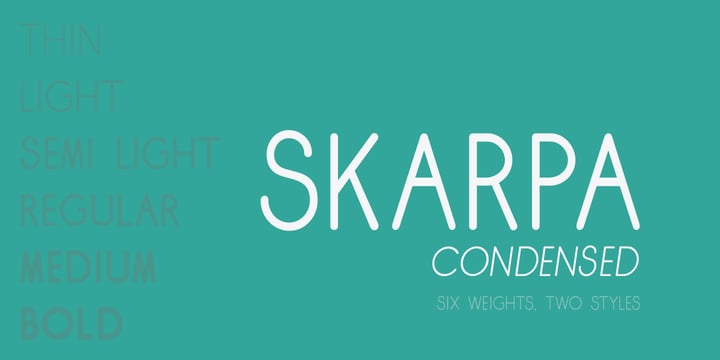 |
This is condensed and more visually compact version of Skarpa font. All kerning has been thoroughly revised and manually adjusted.
The font is based on geometric forms devoid of excessive flourishing.
Would suit modern designs either in fashion, technology or laboratory setting. Would look good on door plaques in pharmacy or simple drawer plaques - especially Medium or Bold specimen. Lighter specimens would look good in leaflet & magazine print (see presented posters).
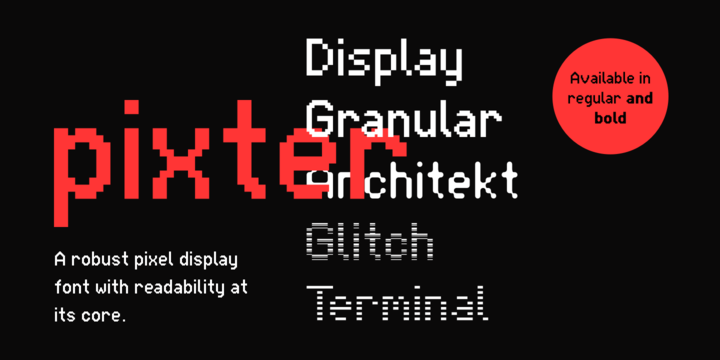
Pixter straddles the lines between the extreme forms of grid based pixel fonts, and more conventional grotesque fonts. Its array of styles create a palette of textures to work with multiple scenarios, from large format display to oversized passages of copy.
Inspiration for Pixter initially grew from old computer bitmap fonts, but branched out into Swiss and dutch graphic design, such as the graphic work of Josef Müller-Brockmann and typography of Wim Crouwel.
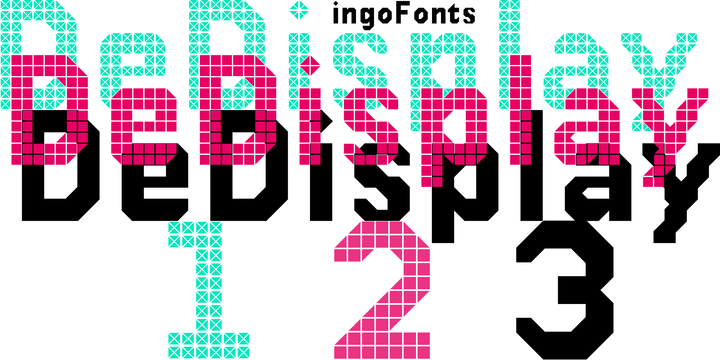
A type designed in a grid, like on display panels
Type is not only printed. There were always and still are a number of forms of type versions which function completely differently. Even very early in the history of script there were attempts to combine a few single elements into the diverse forms of individual characters and also efforts to construct the forms of letters within a geometric grid system. The “instructions” of Albrecht Dürer are probably most well-known.
But although designers of past centuries assumed the ideal to basically be an artist’s handwritten script, the idea which developed in the course of mechanization was to “build” characters in a building block system only by stringing together one basic element — the so-called grid type was discovered, represented most commonly today by »pixel types.« But even before computers, there were display systems which presented types with the help of a mechanical grid display, like the display panels in public transportation (bus, train) or at airports and train stations.
In a streetcar, I met up with a modern variation of this display which reveals the name of each tram stop as it is approached. This system was based on a customary coarse square grid, but the individual squares were also divided again diagonally in four triangles.
In this way it is possible to display slants and to simulate round forms more accurately as with only squares. The displayed characters still aren’t comparable to a decent typeface — on the contrary, the lower case letters are surprisingly ugly — but they form a much more legible type than that of ordinary [quadrate] grid types.
DeDisplay from ingoFonts is this kind of type, constructed from tiny triangles which are in turn grouped in small squares. The stem widths are formed by two squares; the height of upper case characters is 10, the x-height 7 squares.
DeDisplay is available in three versions: DeDisplay 1 is the complex original with spaces between the triangles, DeDisplay 2 forgoes dividing the triangles and thus appears somewhat darker or “bold,” and DeDisplay 3 is to some extent the “black” and doesn’t even include spaces between the individual squares.
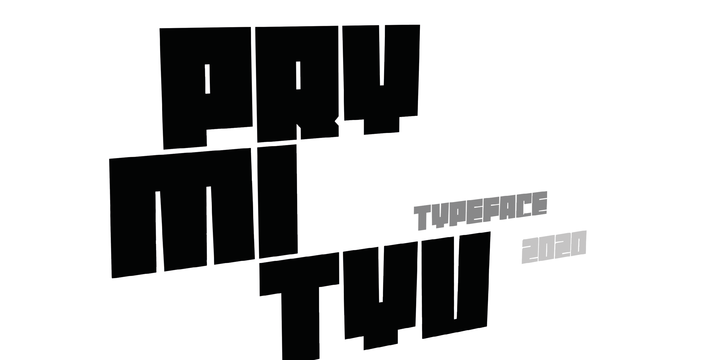 |
Prymityv is inspired by brutalist architecture from the Eastern Bloc. It's heavy and massive, perfect for display purposes. Prymityv contains Latin and Cyrillic alphabet, Latin with Western, Central and South Eastern European diacritics, Cyrillic with Russian, Bulgarian, Serbian and Macedonian and Ukrainian diacritics.
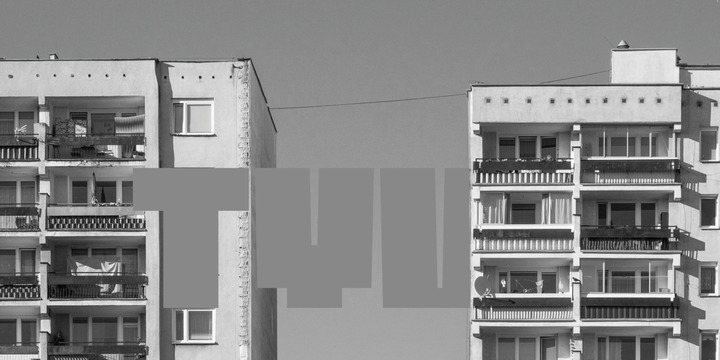 |
| Download Prymityv Fonts Family From Embe Studio |

We present Woop a creative magazine templates for bloggers who love to blog on food, fashion, travel and for personal blog.
Enter your email address below to subscribe to our newsletter.